AlphaGo vs Lee Sedola: results and scores of professional players in th
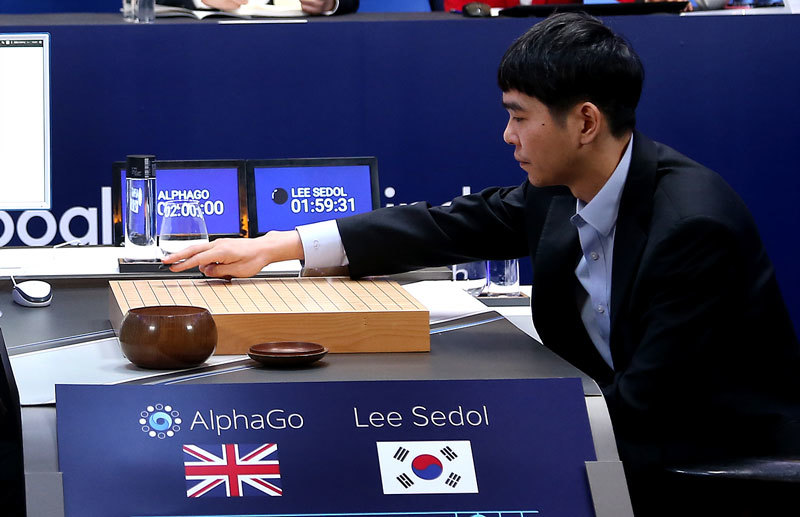 The last fifth game of the go match was held in Seoul yesterday at the Four Seasons Hotel. Each of them was densely covered on Geektimes for a whole week. Someone won in the series, but it is unlikely that such a visitor would be interested in a Russian-language site about high technology and science, if not for one fact.
The last fifth game of the go match was held in Seoul yesterday at the Four Seasons Hotel. Each of them was densely covered on Geektimes for a whole week. Someone won in the series, but it is unlikely that such a visitor would be interested in a Russian-language site about high technology and science, if not for one fact. Played by Li Sedol, the owner of the ninth professional dan, one of the best go masters in the world. His opponent was AlphaGo's computer go system, developed by Google DeepMind. Before the start of the match, it was believed that no product was able to beat a high-level master. But the AI won 4-1.
The speed with which AlphaGo hone go is interesting. Even last October, the system for the demonstration match fed the player much weaker. Five months later, she goes around one of the best. It seems that we reached 1997 in chess, when the computer first beat the reigning champion in the match. From that moment on, chess programs improved their skills to such a level that a person is no longer able to beat them under normal conditions.
Does this look forward to? Should I be afraid of the power of artificial intelligence? I managed to get comments and answers that were provided by the vice-president of the “Russian Federation of go” and the president of the “Sport Federation of go St. Petersburg” Maxim Podolyak, professional players in go and multiple European champions Ilya Shikshin (first professional dan) andAlexander Dinerstein (third professional dan).
Difficulties go
This victory can be compared with another historical match. In 1997, the Deep Blue supercomputer for the first time in the world defeated the reigning world chess champion. Kasparov’s loss was not the last defeat of people. In subsequent years, computer chess has reached a point where even the strongest of chess players cannot beat them under normal conditions.
Go (baduk, weiqi) is a board game that originated in Ancient China and gained considerable popularity in South Korea, China and Japan. Today , about 60 million people play go . Players place stones of two colors on a board of a certain size. The goal is to fence off a larger area than the opponent on the board.
The President of the International Chess Federation is not without pleasure saying that now the fate of chess awaits the first.
From the point of view of creating AI, with external simplicity, it’s many times more difficult than chess - googol (10 100 ) times, if more precisely. It is so many times more possible positions of stones on a standard 19 × 19 board than in chess. Before the advent of AlphaGo, it was believed that so far any programs are played at the amateur level, and up to the level of masters they have another decade.
The size of the board is far from the only obstacle. Many algorithms that were used for chess are not applicable. The number of moves is greater than in chess. The game starts with 55 possible moves, and soon you need to consider almost all of 361 points on the board. Some of the moves are more popular, some are almost never used. The initial moves of the party - fuseki - quickly begin to go into something original. In chess, pieces are removed from the board, in go they are added (although it is possible to remove by capturing stones). This excludes the creation of a base for party endings. Existing systems cope poorly with the end of the game, including this because of a co-fight.
Computer go systems do exist. Most often, such products evaluate moves using a tree search or the Monte Carlo method, employ expert systems with a database of good moves, pattern matching and machine learning. Products such as Crazy Stone, Zen or GnuGo may show good results, but they still lose to professionals.
In 1989, Goliath was unable to beat an amateur sixth dan with a huge handicap of 17 stones. Prior to AlphaGo, winning with 4 handicap stones was considered the highest achievement . This year they were waiting for a decrease to 3 handicap stones. But suddenly a system appeared that outperformed the champions on an equal footing.
Forces of the parties
AlphaGo
 Age: less than 2 years old
Age: less than 2 years old Country: United Kingdom
Dan :?
In 2014, Google acquired DeepMind, a UK-based artificial intelligence company. It was DeepMind that in the past attracted attention by creating artificial intelligence DQN, which independently learned to play 49 old Atari games . When describing another company product - AlphaGo - you can also use the word "yourself."
This computer go system simplistically consists of a combination of the Monte Carlo method and policy neural networks and value networks. Neural networks were trained in several stages of machine learning with the help of 160 thousand games from 28.4 million positions from the KGS server of players from the sixth to the ninth dan. Another million positions were allocated for tests. At first, controlled training of the policy network was carried out directly using the moves of human players. Another policy network has been reinforced learning. The second played with the first and optimized it so that the policy shifted to a win, and not just predictions of moves. Finally, training was conducted, reinforced by a network of values that predicts the winner of games played by policy networks. The result of correct prediction of the next move was achieved in 57% of cases.accounted for 44%.
Technical components were considered in more detail both on "Giktayms" , and on "Habr" .
AlphaGo was compared with other programs - it almost always outperforms any competitors - and as a human player. To do this, with the participation of a judge from the British Federation of Go, a match was organized against three-time European champion and second professional dan Dan Fan Hui. Hui lost all five games.
Lee Sedol
 Age: 33 years old
Age: 33 years old Country: South Korea
Dan: 9 professional
Another participant in the match is a professional player in Go Lee Sedol. Sedol received his first professional dan in 1996 at the age of 13. Sedol has 18 international titles, he is one of the five strongest players in the world.
AlphaGo beat European champion, where go level is lower. At the same time, both the program and Hui made mistakes. Not surprisingly, Sedoll quickly accepted the challenge and agreed to play against AlphaGo. Lee said he could easily win with a score of 4: 1 or 5: 0. In two or three years, Google will want to take revenge, and then it will be more interesting to play, said Sedol.
Course of events
On March 9-15, the Four Season Hotel in Seoul hosted a match of 5 games according to Chinese rules, where the amount of white compensation for Black's first move (Komi) is 7.5 points. The winner of the match received a reward of 1 million dollars. If AI wins, the prize fund goes to charity: UNICEF, go development organizations and others.
Attention to games was significant. Technical necessities forced Google to lay a fiber optic line in the hotel. The search giant did not send 1920 processor cores and 280 video accelerators on which AI was launched to Korea . Instead, a connection was made with Google Cloud Platform servers somewhere in the Midwestern United States. The stones on the board for AlphaGo were arranged by cameraman Aja Huan (the sixth amateur dan).
The press pack is just wild! pic.twitter.com/9KS04YlwpQ
- Mustafa Suleyman (@mustafasuleymn) March 9, 2016
The match was attended not only by the head of the division Demis Hassabis, but also by the former CEO of Google Eric Schmidt, as well as one of the key engineers of the company Jeff Dean. Go is a popular game in Korea. The match effortlessly made its way to the front pages of Korean newspapers, and was attended by members of the Korean parliament. The games were broadcast in Korean, Japanese, Chinese and English. In English alone, an average of 80,000 people watched YouTube broadcasts.
March 9, Wednesday. Game one
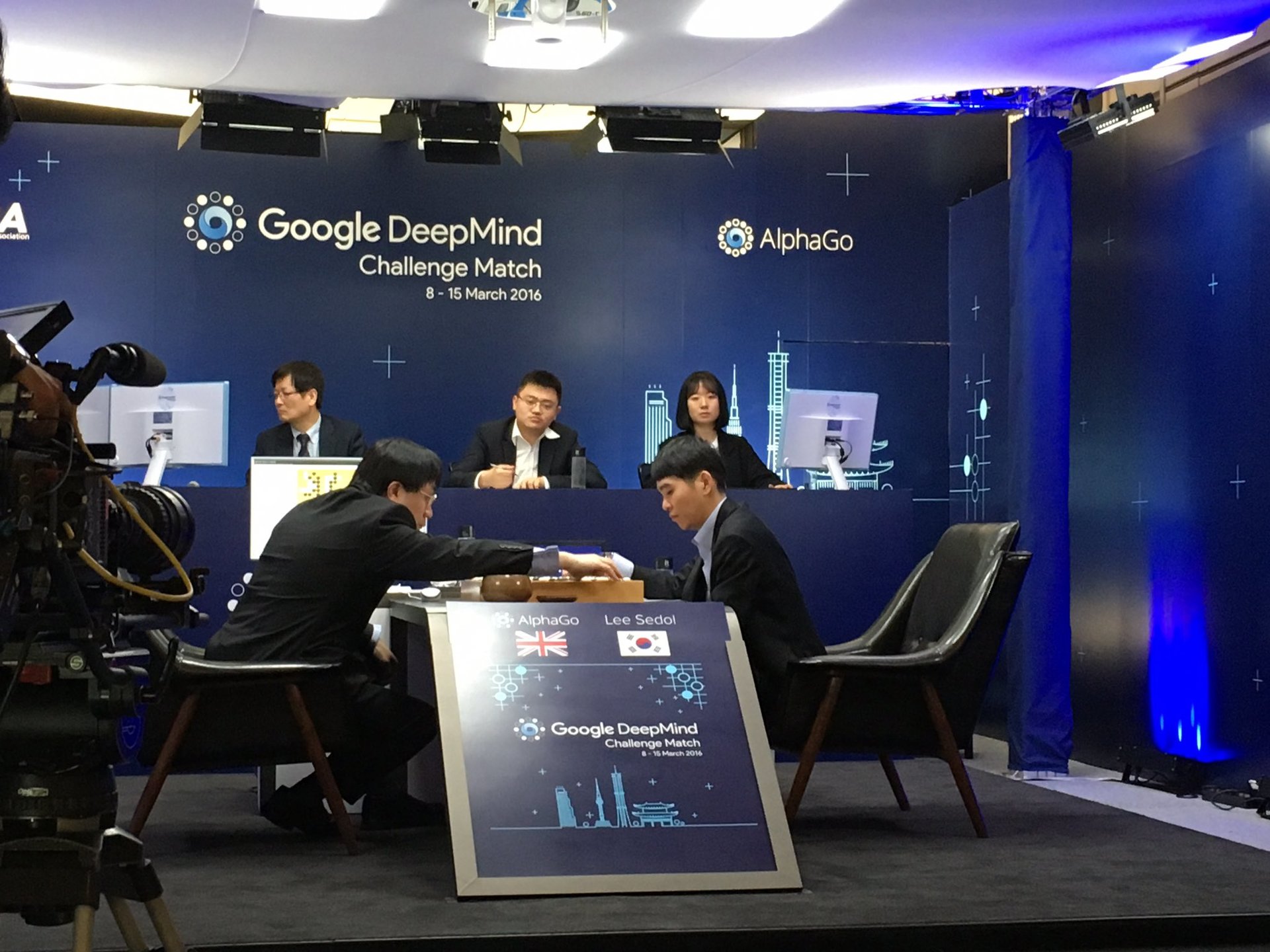
Photo by DeepMind co-founder Mustafa Suleiman
Black: Lee Sedol
White: AlphaGo
Result: Lee Sedol admitted defeat
Moves: 186
Moves
Full broadcast
Summary of the game in English
Comments by the Russian Federation go
Post at Geektimes
At one o'clock local time the first game started. Black played the homework, and in seven moves the combinations were to go beyond any base. The gray-haired man showed his typical style and attacked . But AlphaGo did not hold back - the system began to advance after about 12 stones.
According to commentators, AlphaGo played like a human: the system looked for and created vulnerable groups of stones to make strong moves. Although the AI made a few mistakes, Black had serious reasons for concern. In the last twenty minutes of the game, AlphaGo developed an advantage. The game for 3.5 hours ended with the ninth dan master admitting defeat.
As Sedoll later said , AlphaGo made one unusual move that no human would have made. A representative of a team of people did not expect such a game. The system played noticeably stronger than against the European champion. As the head of DeepMind Hassabis said, it's not even about computing power - they are about the sameas in the match against Hui. For the past five months, AlphaGo has played against herself and used reinforcement training to improve her own skills. The increased power came as a surprise.
Did the game's strength and style improve after the match with Fan Hui in October 2015? All three commentators agree that there are significant changes. Ilya Shikshin, says that the program has noticeably increased the skill from October from the level of the European champion's game to the level of the world champion:
“I must say that this is a significant difference. The published games of the program against Fan Hui left great doubts that AlfaGo could defeat Li Sedol. But over the past few months, the program has managed to make a big leap. ”
“Lee Sedoll didn't know who he was playing with. And the fact that in the first installment he tried to provoke the program to a mistake with the help of non-standard first moves is evidence of this. Instead of trying to find weaknesses in the program, he should play his normal game. In this case, it would not be obvious who would win. ”
Alexander Dinerstein noticed the game of two different versions of the program. The version that played with Fan made significantly more mistakes.
March 10, Thursday. Second game

Photo by DeepMind co-founder Mustafa Suleiman
Black: AlphaGo
White: Lee Sedol
Result: Lee Sedol conceded defeat
Moves: 211
Moves
Full translation
Game summary in English
Comments by the Russian Federation go
Post on Geektimes
After the first game, Sedol admitted that he was shocked but optimistic : he believed that opening moves would make it possible to achieve greater chances of victory. The second game made the outcome of the match more expected.
AlphaGo system played black, that is, went first. AI made aggressive moves. The beginning was unusual. Commentators could not say whether it is good or bad. White played more conservatively.
Neural networks are not configured for the maximum number of points. The program is looking for moves that will achieve victory. This is what DeepMind researcher Thor Grapel explains for strange solutions. Between the move, which will give a win with an advantage of 80%, and another, which will allow you to win in 99 percent probability with an advantage of 1.5 points, AlphaGo will choose the latter. Sometimes the system loses points, but it only improves the chances of winning. Does this mean that weak moves are a sign of a car’s confidence in victory ?
In the first game, Sedol still had time on his watch. This time he exhausted it, so a person had to spend just a minute a turn. By the end, AlphaGo had exhausted its time, so the speed of the exchange of moves accelerated to the limit. But not for long - White admitted defeat. As said the head of DeepMind Hassabis, AlphaGo was sure of victory still somewhere from the middle of the game.
Could DeepMind take into account the characteristics of a particular player and lay its characteristic features in AI? Maxim Podolyak says that the technical capabilities were:
“Since the base of professional games is in the public domain, it would be surprising if they were not used in the preparation of AlphaGo. Thus, we can expect that the program has a detailed profile for all professional players, since its construction is no different in principle from the construction of a profile of user preferences. And in this Google is strong. "
A similar point of view is expressed by Ilya Shikshin:
“I’m sure that all the games of the publicly available parties of Lee Sedol (more than 1000) were uploaded to it. The knowledge of these games and the possibility of reproducing them at any time could give an advantage to the program, while Li Sedol could only study the games against Fan Hui before the match, where AlphaGo was significantly lower. ”
However, DeepMind says that AlphaGo was not reconfigured specifically for Lee Sedola. Yes, and it is hardly possible to make big changes to the neural network by running several hundred parties.
Saturday, March 12th. Game three
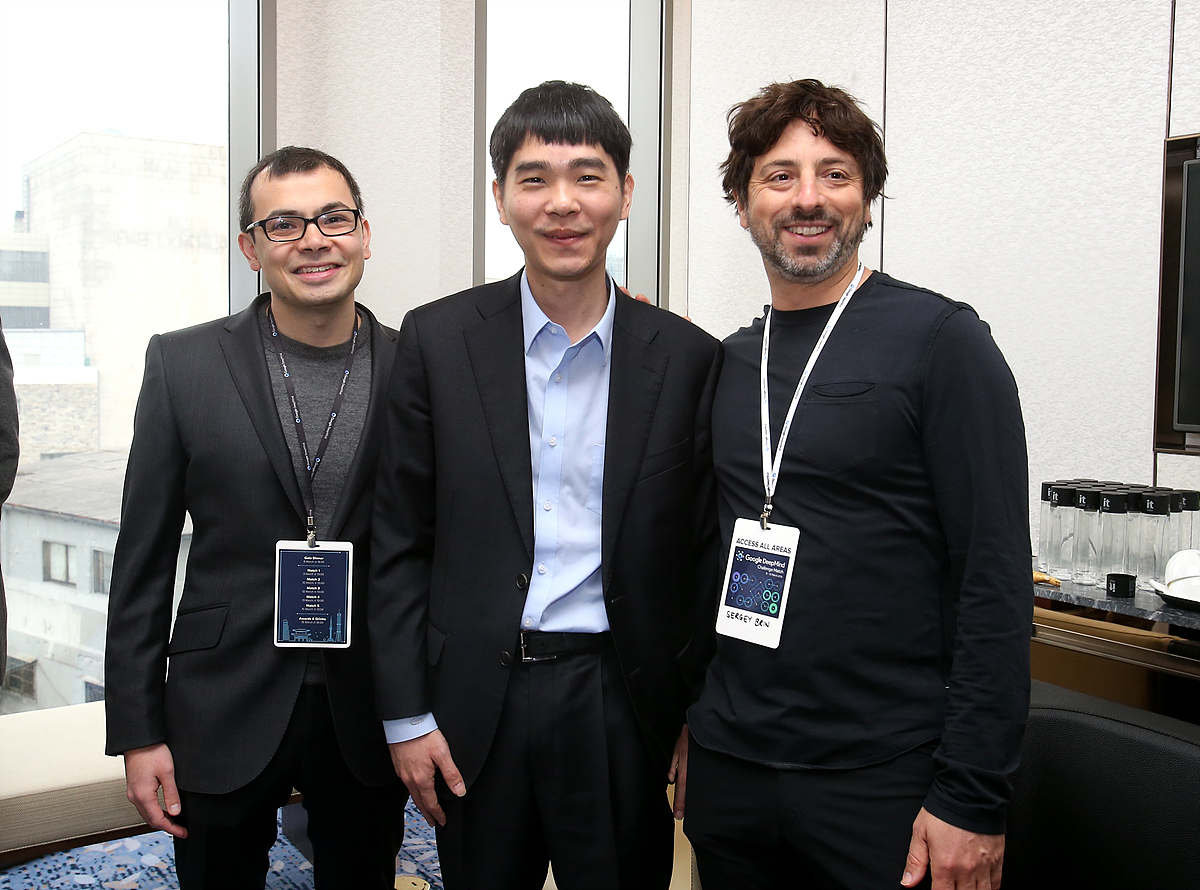
From left to right: DeepMind founder Demis Hassabis, ninth professional dan owner Lee Sedol, Google co-founder Sergey Brin.
Blacks: Lee Sedol
White: AlphaGo
Result: Lee Sedol conceded defeat
Moves: 176
Turns
Full broadcast
Summary of the game in English
Comments by the Russian Federation go
Post on Geektimes
The opportunity to decide the outcome of the match already in this game attracted attention to the game. Google co-founder Sergey Brin flew to Seoul without a pump and visited the game. It was clear that victory was a demonstration of the power of technology that underpins the services of the search giant. From advertising preferences to robomobiles that can move independently, almost everything Google relies to one degree or another on systems with elements of artificial intelligence.
As in the first game, Sedol went black, that is, the first. Also, the experience of two parties could be attributed to a number of favorable moments for a person. Rumor has it that Sedoll and a team of go experts spent the night looking for AlphaGo's weaknesses. Alexander Dinerstein agrees with this:
“I heard that Lee Sedol did not sleep at night, analyzing games and getting ready for the match in the company of his colleagues - Korean go professionals. Program weaknesses were found, but failed to use them. It seems to me that he should have played more actively. With the struggle, as he usually does. The peaceful go that we saw throughout the match is not his hobby. ”
Indeed, in the third game, Black's first moves were aggressive. According to the commentators of the match, in the first two games Sedol tried a different style from his usual style, trying to put pressure on the weak points of the system. In the third game, he demonstrated his typical style with a good start and strong ko in the end. Albeit with an error, AlphaGo showed the ability to work with co-fighting - usually computer systems cope poorly with such. In previous games, there was no chance to demonstrate this skill.
The decisive party determined the historical value of what happened. This was AlphaGo's third victory in a five-game match. This meant that the computer system had already demonstrated superiority. Two subsequent games were to show its depth.
Sunday, March 13th. Game four
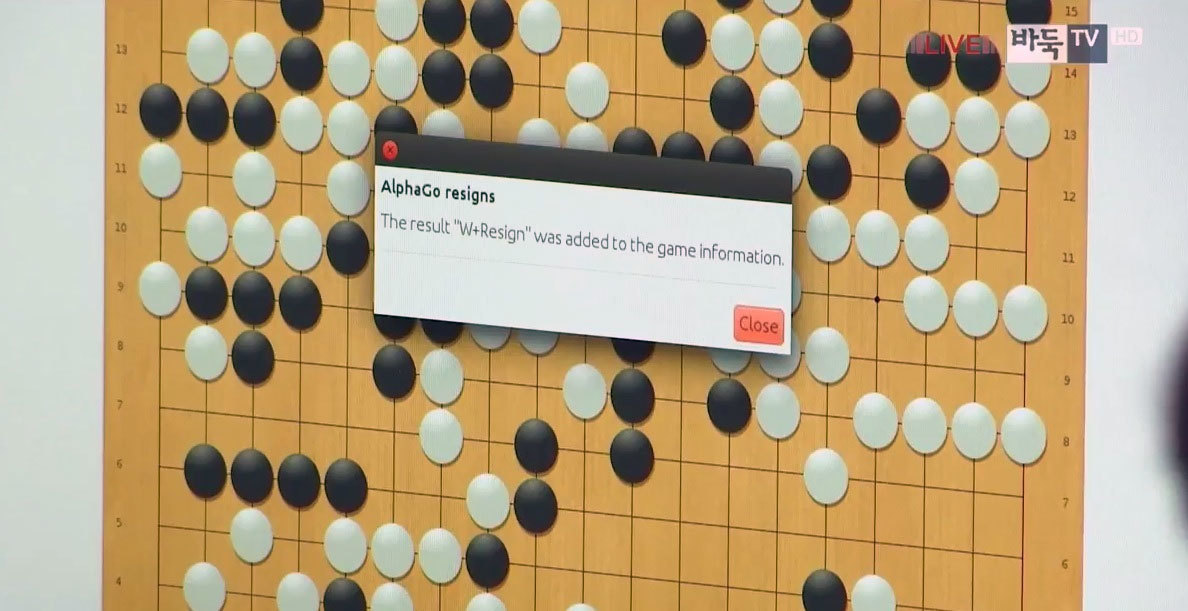
So AlphaGo admits defeat
Black: AlphaGo
White: Lee Sedol
Result: AlphaGo conceded defeat
Moves: 180
Moves
Full translation
Summary of the game in English
Comments by the “Russian Federation go”
Post on Geektimes
After the third defeat of a person, one of the topics of the press conference was the question, is whether AlphaGo has weak points. The gray-haired man mentioned how he felt they were. He apologized to the Korean nation and the go player community for the result.
Sedoll chose the Amasi strategy, capturing territory around the perimeter, not the center. White's opening moves were the same as in the second game. White allowed Black to capture the center, concentrating on the edges and corners. As in previous games, Sedol had run out of time before his opponent, which meant only a minute per move.
White’s 78 move turned out to be so great that commentators described it as tesuji, some called it “the hand of God.” Perhaps Sedol really found a weak spot in the computer system. AlphaGo answered weakly. According to the head of DeepMind, Demis Hassabis, on move 79, the system made a mistake, considering that the chance of victory was 70%. But she understood it only on the 87th move. After that, the AI got confused.
AlphaGo began to make frankly weak and terrible moves. The system recognizes defeat when the odds of winning fall below 20 percent. About this, Google engineer David Silver recalled during a break, which took Lee Sedol. This is necessary in order to preserve the culture of the game - to continue in a clearly unfavorable position would be disrespectful to the opponent. Silver declined to comment on a series of slurred system moves. The game continued, and Sedol was still forced to work in conditions of lack of time. AI made another mistake, and later defeated. The result of the confrontation for 4.5 hours was the first victory of a man in this match.
Sedoll said he was never congratulated so much for just one win. He mentioned that the car is not so strong when it goes black.
March 15, Tuesday. Game fifth
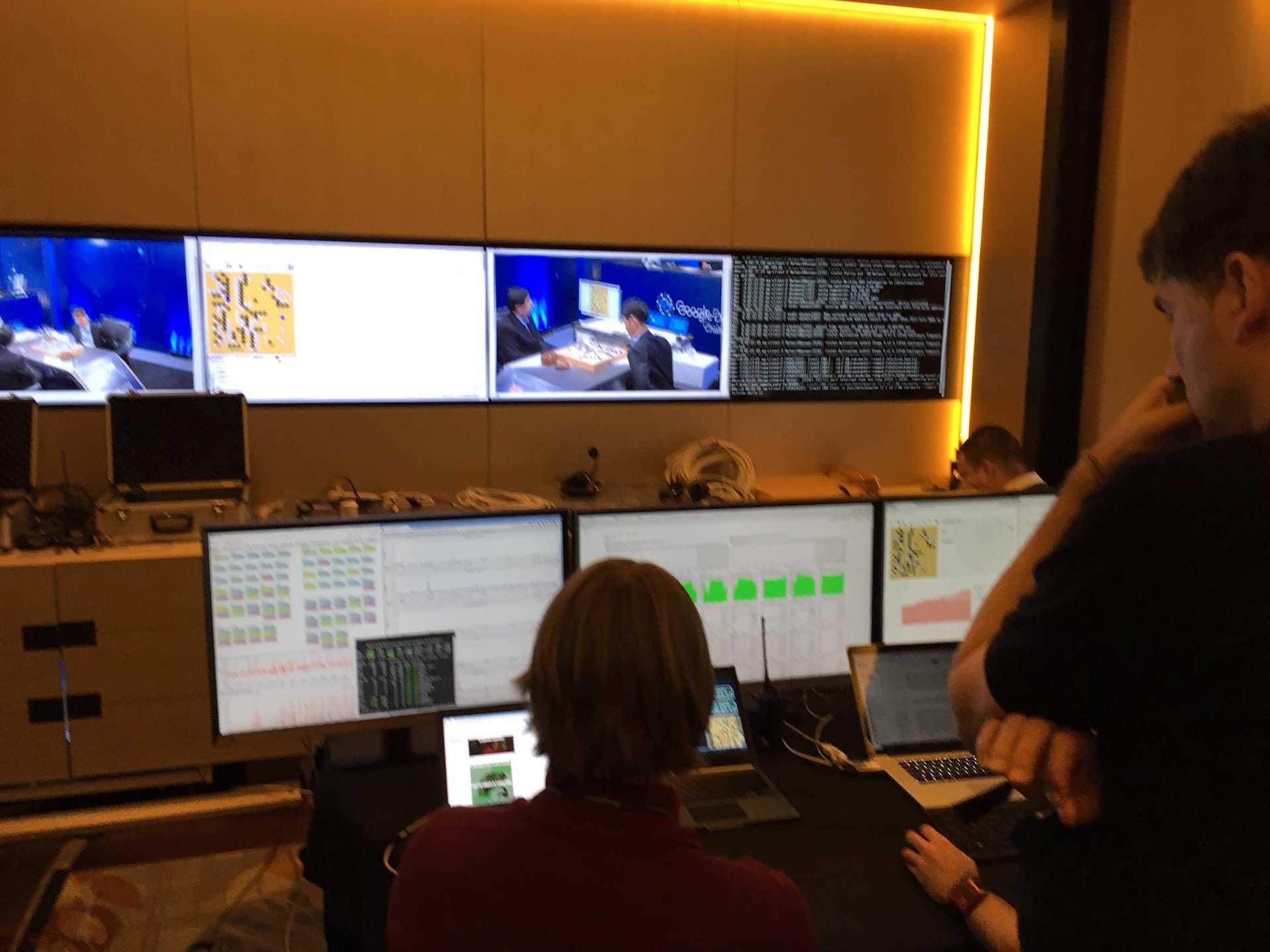
Control Room AlphaGo, Mustafa Suleiman
Blacks: Lee Sedol
White: AlphaGo
Result: Li Sedol admitted defeat
Moves: 280
Moves
Full broadcast
Summary of the game in English
Comments by Russian Federation go
Post on Geektimes
Black started in a style similar to the first game. Then Sedol tried to mark out the territory in the upper right and left corners - a strategy that he successfully used in the fourth game. AlphaGo took the center. From 48 to 58, the man and the car went flush. But AlphaGo did not see the tesuji of blacks, and Lee burst forward.
Due to a small mistake, AlphaGo slightly worsened its position. As a result of a long battle, both players ran out of time, that is, they again had to place each stone in less than a minute. The game came out in deep yose, the board was almost completely filled with stones. White still managed to regain the advantage. Assessing the position, Sedol realized that he was losing. After five hours, he conceded defeat.
Questions
What does the match mean for Lee Sedola?
The result of the match was surprising - the defeat of one of the best human players, the sudden victory of one of the new systems of computer go. Instead of a million, Sedol will receive 170 thousand dollars: 150 thousand for participation and 20 thousand for one victory.
A separate issue is why Sedol lost. As Ilya Shikshin says, he was not psychologically prepared:
AlfaGo managed to defeat Lee Sedola. However, this does not mean that the program plays stronger. I think that their level is about the same. It’s just that Lee Sedol was not psychologically ready to fight the program in the first installments, since it was a huge surprise for him that the program could fight it on an equal footing.
Alexander Dinerstein:
I admit that I did not expect such a situation. Like most go professionals, he was sure Lee Sedol would win easily. But we saw program errors. I believe that the question is still open. Lee Sedol, even in Korea, is not the first in the ranking. I think that other professionals of his level have a chance to win, especially if we see a selection of games played by the program, by which we can look for her weaknesses in the game
What does a match mean for AlphaGo?
For the victory over Lee Sedol, the Korean Paduk Association officially gave the system an honored ninth professional dan. This means that she is considered a top-level player.
Lee Sedol is not the strongest player on the planet, there are others. For example, the owner of the ninth professional dan, Ke Jie claims that with a 60% probability he could beat AlphaGo. Website Go Ratings truly has it higher in the rankings. AlphaGo was also challenged by the Chinese master of the ninth professional dan, Gu Li. There are rumors of requests to play against Iyama Utah. While the AI is choosing an opponent, the redirector has calculated
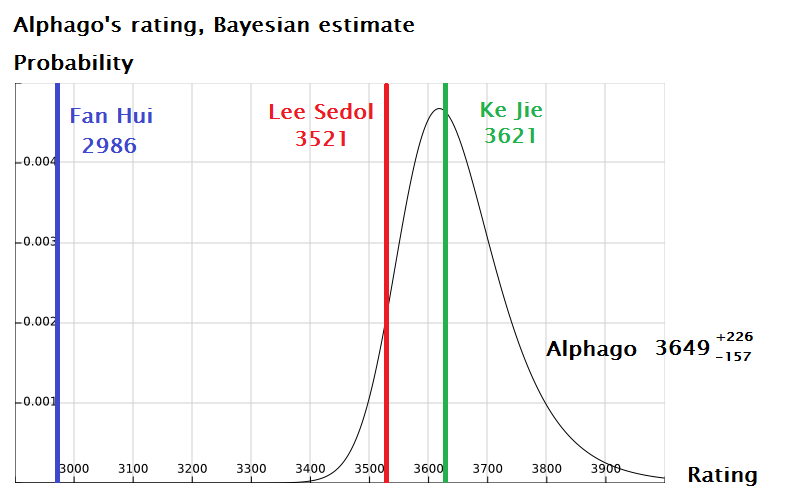
that AlphaGo may be higher than the best of the people in the ranking. According to his estimates by Bayes' theorem, the AlphaGo rating is 3649, while Jie has 3621, lower.
However, to make any statements about the strength of the system is early, if at all possible. Only a few games are published, and the real power of the system is unclear. And does it make sense in rating points if the system can find a weak spot? According to Alexander Dinerstein, the program would be interesting to check in the match against Takemia Masaki, the owner of the ninth professional dan:
“He was one of the strongest masters in the world of the early 90s. We noticed that the program prefers the game to the center, to influence. Lee Sedoll in all parties took points in the corners. And Takemia-sensei is known for being very fond of playing the center and not at all "greedy" at the beginning of the game. It’s not clear how the program would behave against such an unusual style of play. ”
You can expect original and unexpected moves from a computer system that a person would never have thought of. As Maxim Podolyak says, he saw in the AlphaGo moves the natural, explainable moves of an exceptionally strong player:
“As one book says, a party flows like a stream from a mountainside, naturally and powerfully. B.102 looked impressive and impressive in the first installment. But this is not a "divine" move. "
Dynerstein claims that some AlphaGo moves were not considered by people:
“One of the commentators on the match, Kim Songreng, 9th dan (Korea), even thanked the program for its contribution to the development of Go's theory. Decades ago, Fujisawa Sukou, one of the leaders of the Japanese Go, claimed that he knew only 5% of Go's game. The remaining 95 are the knowledge that people do not yet possess. Apparently, the program was able to understand the game even deeper.
What does a match mean for Google?
The Internet giant has once again shown that it has some of the best technology in the world. It was the Google division that was the first to be able to solve another task of computer science. In DeepMind they see utilitarian applications for their best practices: these are shopping recommendation services or medical data analysis.
But you can escape from commercial projects and still dream up about go. It doesn't matter if computers start playing better than humans or not. You can set one product on another and watch the battle between two manufacturing companies. And they are: Facebook is creating a darkforest robot , which so far plays weaker and has not yet participated in official matches against professional players. This month darkforest should compete in the computer world championshipin Japan. The best of the tournament's programs will play against Koichi Kobayashi.
Will someone watch the battle of Facebook with Google on a 19 × 19 board? By the way, it is easy to imagine a confrontation and personal hostility. In January, Zuckerberg talked about his system on the same day as Google. And if Facebook had only news about development, then DeepMind already boasted of a victory over the champion.
Maxim Podolyak:
Unlikely. This would be about the same as looking at how the program paints fractals or colored spots on the screen saver. Nobody is interested in mechanical enumeration of options; there is nothing phenomenal in this. But the fact that a person can do this is a phenomenon.
Alexander Dinerstein:
For chess players such matches have long been held and do not cause much interest. Personally, I would love to watch a program tournament that would be commented on by a person. By the way, it would be no less interesting to watch a top pro tournament with AlphaGo comments.
Ilya Shikshin:
I think that matches between computer programs can be of interest to people. Similar matches have already been broadcast and gathered several hundred spectators. The level of a person in go is still very far from perfect. There is room to grow and develop.
What does a match mean for go?
One can differently perceive the defeat of the smartest people who have absorbed thousands of years of experience, and the victory of a soulless piece of iron with pieces of silicon inside, launching a program that has not been two years. In the community of fans of the game, someone is visibly negative. Others see AlphaGo helping to popularize. But he will only win if he has someone to compete with and learn from, Ilya Shikshin notes:
“The program played very dignified and deservedly won. Could this match have ended otherwise? I think no. I am sure that Lee Sedol discovered a lot for himself in these 5 games. Now he should be ready to fight AlfaGo, but, alas, it's too late. Go-world received a serious rival in the person of this program.
But not only Li Sedol made discoveries. Millions of people who have watched this match have also discovered something new. Someone has enormous possibilities of technology and artificial intelligence, someone has found something new in the game and now looks at it differently, well, for someone, the game of go itself was a revelation.
Personally, I am very pleased to see that my favorite game these days has become the center of attention of the whole world. I believe that with go now everything will be only better. ”
Alexander Dinerstein:
“I suspect that prize money in Asian countries may decrease, but for the rest of the world, the pluses from advertising the match, and it was colossal, should outweigh it. I expect an influx of new players into go, and we should only be glad about this. Many have heard about this game for the first time. ”
It is also possible to solve problems that people don’t get:
“The world of go is certainly upset, but with the advent of the program, we can learn a lot of interesting things. For example, in Go there is a puzzle invented in 1713 by the famous Japanese master Dosetsu Inseki. The calculation goes two hundred moves forward. Entire books have been published on it, but no one could solve it. There are beautiful solutions, but they differ from the task originally announced by the author. Finally, we will find out if this problem has a solution. Or maybe Dossetsu was mistaken? ”
If AlphaGo power systems become the norm, it will be easy to cheat and use the moves of such a system. So far, the champion has been beaten by a huge computing cluster. It is physically impossible to drag him along. Today, the computing power of the smartphone is enough to put any person on the shoulder blades in chess. This did not happen right away, but we should expect a similar thing for go in the near future. Someday, the possibility of fraud will fit in your pocket even in the absence of radio communications. According to Dienstein, now electronic devices at go championships are relaxed:
«У нас на турнирах люди все еще записывают партии на планшеты. В кармане можно иметь телефон и даже выходить с ним в туалет. Но скоро все это изменится и по мерам безопасности мы приблизимся к шахматам, где уже дошли до глушилок сотовой связи и задержек в трансляциях партий (чтобы сложнее было подсказывать). Да и в Интернете у нас до сих пор проходят довольно крупные турниры, к примеру, командный чемпионат Европы. За много лет его проведения не возникало скандалов связанных с подозрением в нечестной игре. Да, можно было открыть базу дебютов, но не факт, что она реально помогает.»
Что матч означает для систем искусственного интеллекта?
The algorithm was created over the months, he was trained to play on human parties, and then he independently reached the highest level. This is one of the best visual demonstrations of the strength and speed of AI.
According to Ilya Shikshin, he was struck by the speed with which the system learned to play:
“In a short period of time, the program learned to play at the highest level. I was interested to observe how the program behaves when it wins and when it loses. ”
What does a match mean for all of us?
Is AlphaGo artificial intelligence?
The system has learned to play go on parties of people. Artificial neural networks have seen as many games as no one has ever played in their entire lives. Then, in games against itself, the system brought the skill to a level that brings victory over the best of people. This is not the case with Deep Blue, when the solution search algorithm was set completely manually.
This is hardly any different from how we learn speech. Children somehow gain the ability to repeat words, put words into sentences, and then express their thoughts in fragments. This takes years of training, this is only possible at some points in life, when the brain is most susceptible. How is AlphaGo different from the person who learned to speak, and then honed the skill before writing literature?
You can look inside the project and be very disappointed: there are algorithms that can be interpreted and understood. But at the same time, AlphaGo fulfills its goal perfectly. This is the problem: the AI in the view of the skeptics must be inexplicable, able to do everything and hate humanity. The simple completion of a task raises the charge of calculating options.
But the question of the essence of the terms is not so interesting. What is more frightening is the thought that AlphaGo plays go better than all its creators and even the people whose parties taught it to neural networks.
Will artificial intelligence destroy us?
Subject to the effect of artificial intelligencesometimes require programs to be aware of themselves. This is exactly what AI does not lay. IBM Watson has beaten people into the intellectual game Jeopardy, but does not know about it. He does not rush about the desire to play yet. He does not rejoice in victory. He does not even understand that he won. He has no consciousness.
AIs are not canonical images in the form of a red HAL9000 light bulb or an evil SkyNet. Artificial intelligence does not have consciousness. This is just a computer program, “smart” enough to perform tasks that usually require the participation of human analysis. This is not a cold-blooded killing machine.
For example, today there are too many scientific articles and studies. It is physically impossible to read everything. We need a system that can read and organize these monstrous arrays of information. And such a system will have artificial intelligence.
But this AI will not kill people. Rather, it will occupy their jobs.
Will AI leave us without work?
Artificial intelligence can significantly increase labor efficiency. This is what should be a matter of concern.
At the dawn of civilization, everyone was engaged in food production, but it was scarcely enough. Today, almost no one is engaged in agriculture, but there is plenty of food. The answer to this riddle is in labor productivity and tool efficiency.
A translation system that only requires proofreading and comparing terms can make life easier for a translator. Does this mean that half of the translators risk losing their jobs?
A simple analysis of the text will allow you to highlight a hot phrase in the article, and then post a similar one with a link to the original through the social networks API. Does this mean that the ranks of SMMs will become thinner? The answer to the requirements to raise the minimum wage to cashiers. A flotilla of unmanned trucks will independently move between cities, and the driver will sometimes only sit behind the wheel to park. What to do with the huge mass of freed truckers?
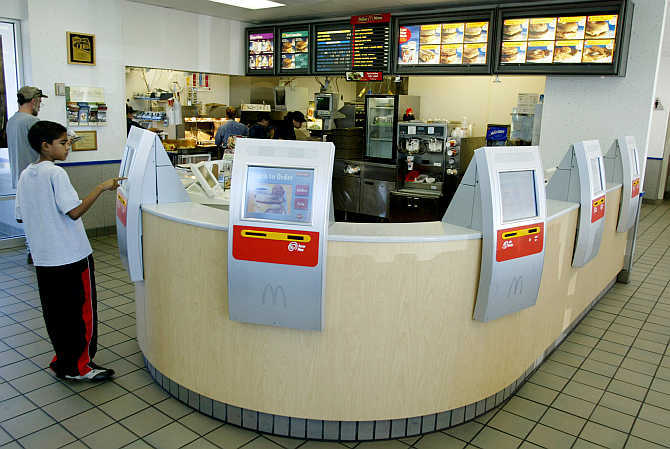
By analyzing the video stream of the broadcast of a sports match, the robot can compose a news article that will not differ in any way from that written by a person. Where in this scenario are there more jobs for journalists?
The expert system will evaluate the legal document and draw up its decision on it. What to do with the vacated army of junior staff in law firms?
Not even the loss of jobs, but their nature is dangerous. First of all, simple low-paying jobs will begin to disappear. Those in such positions are the most economically vulnerable.
Can we adapt to the deep social changes that will not even occur in a revolution, but in a sharp flash? Who will benefit from AI: only those who own such a system? Does this mean another increase in social inequality?
These are the questions that should scare the next AI winter thaw. It should not be this primitive phobia of the almighty mechanical killers. The news about the uprising of cars will remain the headlines "the robot killed a man ." Technology is just a tool. Danger to people create other people.
AlphaGo is another messenger of such an obscure future of change. But this AI is not a threat to go, if only because the game, thanks to it, is only becoming more popular. Another player cannot do worse, whose games are watched by millions.
